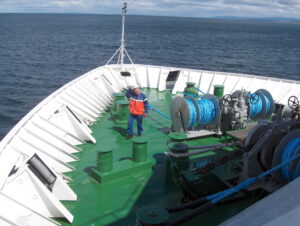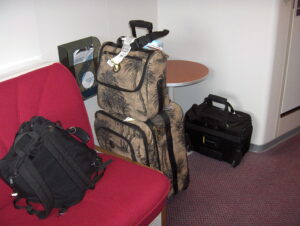‘Traveling to Antarctica Christmas 2005’ Category
» posted on Monday, December 21st, 2020 by Linda Lou Burton
El Poocho and the Sunny Day
Christmas in Antarctica originally posted by Linda Lou Burton December 21, 2005 from Punta Arenas, Chile – Sometimes, things just can’t get any better. The engine noises this morning sounded different. That’s what woke me up. A peep out my bigger-than-a-porthole window gave me two surprises. We had just docked at the Punta Arenas pier, and, the sun was shining!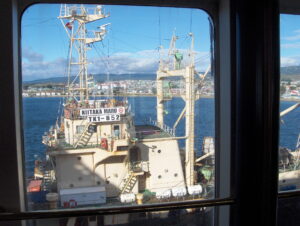
We’d been instructed at the briefing the evening before that our buses would depart from the other end of the pier by 8:30 AM. The sedge-ool was tight, we were warned. The ship had to leave at 3 PM. We’d also been warned about something else. “This is a military pier, so don’t be taking photographs as you walk to the end of it. Utter-vise, you vill be shot unt da bak!” our leader promised.
I had carefully laid out my clothes the night before, so it didn’t take me long to get myself ready to roll and up to the dining room. The eggs were fried today, and I nibbled on some eggwhite and a piece of toast. Should we take our windbreakers, my tablemates pondered? “I always say,” I said to Pamela, “take it, you don’t have to wear it!” We settled on that.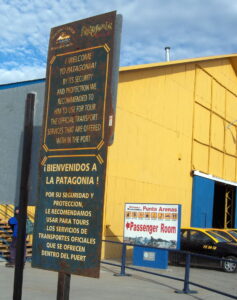
Deck 3, the Security Bar Code Scanner was ready for us. I checked myself out and began the dangerous Walk of the Pier. No military presence was apparent, just a Japanese ship unloading cargo and the Australian Antarctic Dream. I entered the gold CUSTOMS building at the other end and browsed the postcards and knitted woolens. It was only 8:10, and a pleasant 51 degrees.
Needing no woolens, I exited the building in search of my bus. Nordnorge Fitz Roy English was the one I needed. Another bus headed for the Fitz Roy was identified as German. Three buses were chartered for the Otway Penguin Colony. I figured I would see enough penguins in Antarctica. The Fitz Roy promised sheep, and a barbecue!
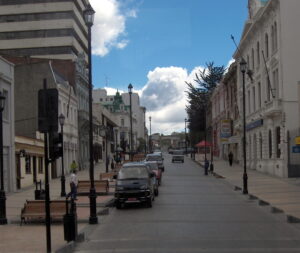 “Hi, I am Patricia!” a smiling tour guide greeted me at the bus. I chose a window seat and piled my things around, settling in for the two-hour ride. Patricia told us about Punta Arenas as we drove through the quiet early morning streets. “The children are on summer holiday,” she explained, “and the businesses do not start so early.” She pointed to monuments, buildings of importance, streets, trees. “It is very windy here,” she said. “There are ropes around town that you can hold onto to keep from being blown down some days.” She explained the history of the area, the industry, the recreation. Punta Arenas is capital of the Magallanes region, on the Strait of Magellan at latitude 54 south. It has a population of 140,000.
“Hi, I am Patricia!” a smiling tour guide greeted me at the bus. I chose a window seat and piled my things around, settling in for the two-hour ride. Patricia told us about Punta Arenas as we drove through the quiet early morning streets. “The children are on summer holiday,” she explained, “and the businesses do not start so early.” She pointed to monuments, buildings of importance, streets, trees. “It is very windy here,” she said. “There are ropes around town that you can hold onto to keep from being blown down some days.” She explained the history of the area, the industry, the recreation. Punta Arenas is capital of the Magallanes region, on the Strait of Magellan at latitude 54 south. It has a population of 140,000.
Soon we were at the edge of town, on Highway 9 headed north, with the sun shining on Estrecho de Magallanes to our right. Patricia told us about the plants and the animals of the region. The driver pulled to the side of the road so we could see the nandu, mother and baby, feeding in the bushes. Nandu is very like ostrich. The driver stopped again to show us guanaco (llama-like), and condor flying overhead.
After a while we turned onto a highway-like graveled road, headed west now, towards Isla Riesco. “We will cross on the ferry there,” Patricia explained, “to get to the Fitz Roy.”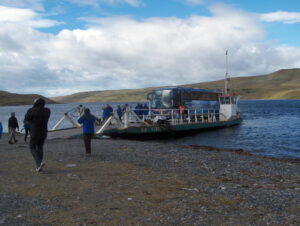
The ferry was just long enough to fit one bus. The waters from Seno de Skyring and Seno Otway funneled through a narrow channel here, with Isla Riesco across the way. Many of us departed the bus for photos as we waited while the wind blew the ferry one way, the engines brought it back to another for alignment. Several fishing boats rested by the landing, the fishermen busy with their morning chores. Finally the bus was on, we stepped across the metal ramp, and off we went. The wind was sharp, but the waves showed no white, only brilliant blue.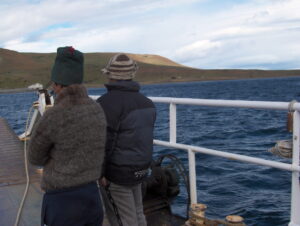
Five minutes to cross. Signs there, Sector Nord, Sector Sud, listing all the farms. Back on the bus, we headed south. We climbed the hill on a narrow gravel road. The waters of the Seno were all around, and flowers colored the low-growth sage as far as you could see with purples, pinks, and yellows. Lupine! Scotch Broom! Through a gate now, over a cattle stop, I see some buildings down ahead.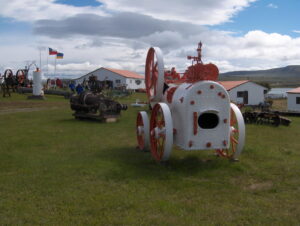
Estancia Fitz Roy is owned by the Fernandez family. I do not know how many acres, but the land slopes to the waters, the wind is constant, it is perfect for raising wooly sheep. The buildings are painted white, every roof is orange. The big barn for shearing the sheep is also a museum, filled with tools from other eras.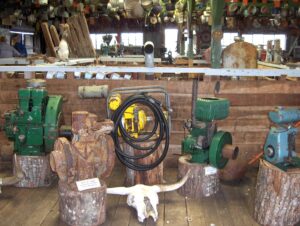
A demonstration is going on, the shearer wears a hat made of wool. He holds the sheep against his chest, her head is angled back, she is resigned. The layers of wool fall to the floor in a pile of dirty gray. The sheep is ready now, for the summer heat.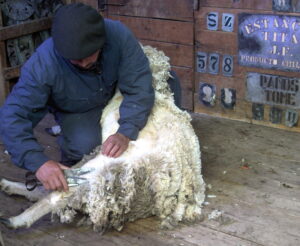
Outside, more sheep wait in the pen. They are dirty gray, not Bo-Peep fluffy white. A black alpaca has been placed inside for calm. His head is higher than mine, he watches to see what I will do. I snap his picture, of course.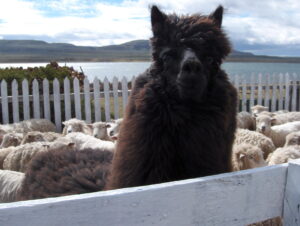
A path ahead, a steeple visible through the trees, a cross. Inside the chapel, an altar, the pews are made of logs, split in half and smoothed.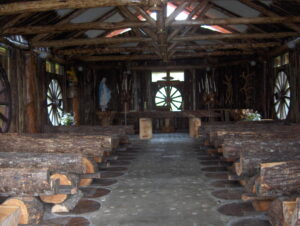
Another path, lined with brilliant yellow bushes, higher than my head. Scotch broom, again. At the end of the path, the smell of food.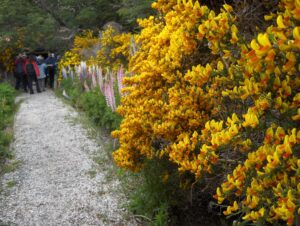
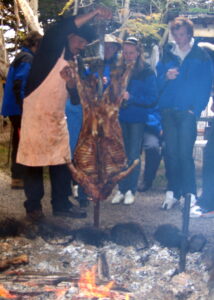 Under a shelter two fires are going. A split of lamb is skewed to a stick beside a pit of fire. A Fernandez family member has a tray, he serves the pisco, strong drink, sour.
Under a shelter two fires are going. A split of lamb is skewed to a stick beside a pit of fire. A Fernandez family member has a tray, he serves the pisco, strong drink, sour.
Inside, another cooking fire, a grill six feet across, lamb is sizzling hot. The room is made of logs, the floor is stone. The large round tables are metal saws, bolted to legs, a strip of metal welded to the edge to cover the sharp; the seats are logs, cut stool-high and padded with wool. Wood stoves scattered around the room, the largest filled with fire, for heat. The others are cold, and serve as tabletops. The food is ready! Bowls heaping with potatoes, peas, green beans, tomatoes, salads. Piles of bread. We take our plates and stand at the grill, to be served the lamb. The Fernandez family circles the room, pouring the Chilean wine, greeting, smiling their welcome.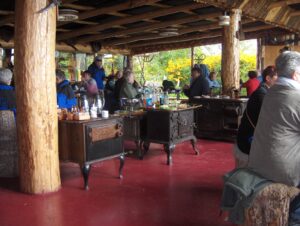
Outside the window wall another show. Sheep are herded inside the fence, a rider on a horse is in command. The sheep turn this way and that, moving as one, till he decides it is time for them to depart the gate. He calls to the dog to direct, and in a flash, the sheep are gone.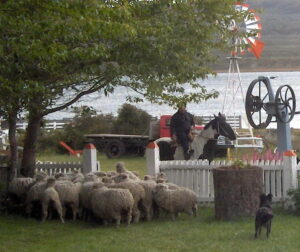
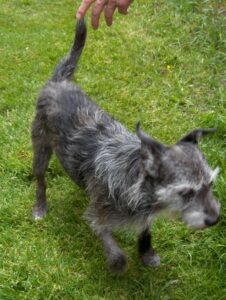 El Poocho. The dog. I’ve read of sheep dogs, collies, intelligent and strong. El Poocho was a mutt. Tiny and gray, more like a terrier, but still a mutt. He owned the farm. He greeted the bus, led the tourists to the barn. He teased the puma in his cage. He told the sheep just where to go, and when. He was friendly. He was in charge! I wandered out, followed him along the lupine path. Stop doggie, stop! I want your picture! Every time I thought he would be still, he lifted his leg to water the plants. Someone clever brought some lamb. Here doggie, here! He stopped to sniff, but did not stay. He barked and ran in circles as we boarded our bus.
El Poocho. The dog. I’ve read of sheep dogs, collies, intelligent and strong. El Poocho was a mutt. Tiny and gray, more like a terrier, but still a mutt. He owned the farm. He greeted the bus, led the tourists to the barn. He teased the puma in his cage. He told the sheep just where to go, and when. He was friendly. He was in charge! I wandered out, followed him along the lupine path. Stop doggie, stop! I want your picture! Every time I thought he would be still, he lifted his leg to water the plants. Someone clever brought some lamb. Here doggie, here! He stopped to sniff, but did not stay. He barked and ran in circles as we boarded our bus.
Senora Fernandez came aboard to bring a gift. Homemade rhubarb jam. Merry Christmas! She said. Across the picket fence, inside the window of her house, I saw a Christmas tree. Outside, the lupine bloomed.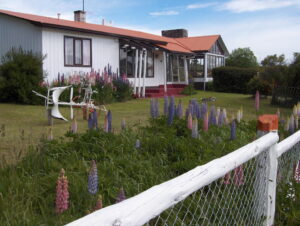
Now, back across the cattle stop, past the hills of sage, down to the ferry stop. The wind was stronger now, the engines could not seem to hold the place, the ferry swayed. A shovel was brought forth, a new path dug. Our driver backed the bus across the new-piled gravel, then the metal ramp, frowning all the while.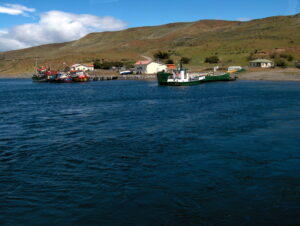
I mostly slept as the bus sped back to Punta Arenas, two hours for the ride. Patricia did not talk much, although I asked to see Isla Riesco on the map. She told me of the coal mines there, but did not know what kind of coal. I saw no signs of mining.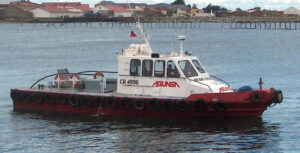
We’re late! The ship was to depart at 3 and it is now 3 PM. The Chilean pilot who guides the ship into the port is waiting for us to leave. Patricia tells us to gather our belongings. “We will drive you to the ship! Get your ID ready!”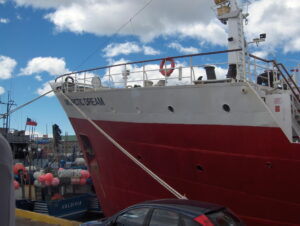
A hurried wave at Customs; the bus zipped along the pier, past the Australian Antarctic Dream, past the Japanese freighter, still unloading cargo. Up the gangplank, beep, I’m coded back onboard.
» posted on Sunday, December 20th, 2020 by Linda Lou Burton
Mah-za-yan-ic Shortcut and My Ed-u-kay-ted Brain
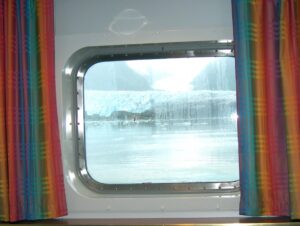 Christmas in Antarctica originally posted by Linda Lou Burton December 20, 2005 from Strait of Magellan, Chile – The alarm went off and I jumped out of bed and peered out the bigger-than-a-porthole window. A chunk of ice went floating by. We were 15 minutes away from the announced destination time at the Skua Glacier, so I splashed cold water on my face and threw on yesterday’s clothes. Two cameras in hand, I headed for Deck 7.
Christmas in Antarctica originally posted by Linda Lou Burton December 20, 2005 from Strait of Magellan, Chile – The alarm went off and I jumped out of bed and peered out the bigger-than-a-porthole window. A chunk of ice went floating by. We were 15 minutes away from the announced destination time at the Skua Glacier, so I splashed cold water on my face and threw on yesterday’s clothes. Two cameras in hand, I headed for Deck 7.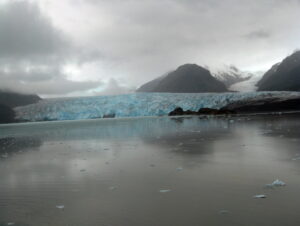
It was cold but not uncomfortable, and a small crowd was gathering, with, like me, cameras in hand. I could see it ahead, at the head of the tiny fjord, a blue glow coming into the sea. Our info described it as picturesque. That it was. I leaned against the rail in the frosty mist and did my photographing thing. Glaciers are blue because the ice is so dense the air has been forced out of them, I’m told. The ship spun three times, slowly, so that even the lazyheads who didn’t want to leave the warmth of their cabins could see. And then we moved out of the fjord and on to Amalia Sound.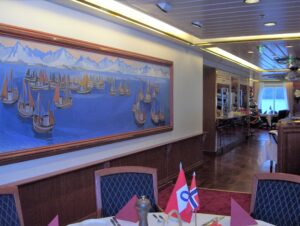
I was catching on to the ship’s routine now. Breakfast. Lectures. Relax by the windows. Watch the world float by, today, still misty with fog. Crepes for breakfast, lots of coffee. A lecture at 9:30 on Patagonia and Tierra del Fuego by Dr Fanz Gingele in Kapp Horn Hall. The Germans have Michael Theusner speaking about Antarktische Wetter and Klima in Nordkapp Hall at the same time.
We have a good lecture staff. Our Expedition Leader is Ian Michael Shaw, Canadian, a youngish, humorous guy, whose credentials claim he “has been beaten up by monkeys on Gibraltar, lived in a Taoist Temple, broken into a Top Secret Naval Base in Vladivostok, tattooed in Tahiti, and sunburned in Brazil.” He also claims to have eaten breakfast in the eye of a hurricane, not such an unusual feat in the minds of Gulf Coast residents of the US, I’d say. He has led expeditions in Russia, Greenland, Polynesia, the Amazon, and in and out of fjords, north and south. Every day, he studies the weather conditions, considers the ship speed, and tunes into world events that might affect anything ahead, before settling on an itinerary for the next day. Then at 6 PM we are invited into the Torghatten Salong (that means Observation Lounge, or Panoramic Room, by the way) for a briefing on what to expect. “Even so,” he warns, “everything is subject to change due to operational or climactic reasons, or Force Majeur.”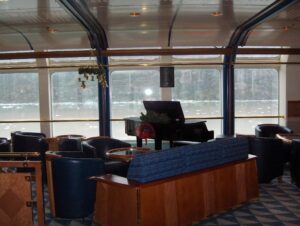
Today, we were to expect two things: the Skua Glacier in the morning (check), and entry into the Strait of Magellan about 5:30 in the evening. We should wake up on Wednesday in Punta Arenas, he advised.
What do you know about the Strait of Magellan? You probably remember from your social studies and geography classes that Mr Magellan came across a more sheltered body of water at the tip of South America than what the ships would have to endure by going all the way around the outer islands – a sort of nature-made Panama Canal. However, many of the largest sailing ships could not maneuver in the narrower, less windy waters. The rugged, mountainous area through which Estrecho de Magallenes passes, remote from the rest of the country, is called Magallenes (Mah-za-yan-es, for the Spanish sound).
I can see this on my map: Cabo Froward, in the Strait, is, officially, the Southernmost Point on the South American mainland. We’re due to pass that spot around 3 AM tomorrow morning. All the other famous markers are on islands!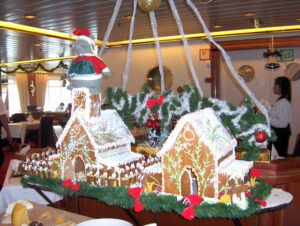
Other items fitted around Breakfast, Lunch, and Dinner today:
- 10:30 Penguins: Those from the Other Side
- 15:00 Krill and the Antarctic Food Chain
- 16:30 A Brief History of Antarctic Exploration 1772-2003
- 21:00 Film: On the Icy Edge of the World
I say mate, me brain is get-in a bit wrinkled, now!
» posted on Saturday, December 19th, 2020 by Linda Lou Burton
South Pole Santa Comes by Boat
Christmas in Antarctica originally posted by Linda Lou Burton December 19, 2005 from Puerto Eden, Chile – Puerto Eden was the featured stop for Monday, according to the script. Located on Wellington Island at Latitude 49 (Seattle is 47), Puerto Eden has only 160 residents. We were told two things at the evening briefing the night before.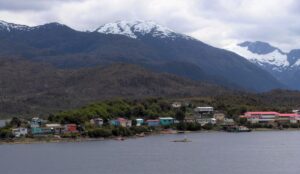
One, we would cross the Gulf of Sorrows, Golfo de Penas, beginning at 9 PM, going out into open waters. It will be rough, we were warned. Take your seasickness pills early on. We’ll be into calm waters again around 5 AM.
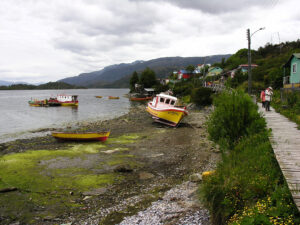 Two, we’d have the chance to go ashore at Puerto Eden, walk the wooden boardwalk, and buy a few souvenirs from the locals. The shore trip would be in PolarCirkel boats, and the boats would return with the children of the village. They were coming for a Christmas party with the Captain! Pizza would be served, with ice cream for dessert. Presents were waiting, too.
Two, we’d have the chance to go ashore at Puerto Eden, walk the wooden boardwalk, and buy a few souvenirs from the locals. The shore trip would be in PolarCirkel boats, and the boats would return with the children of the village. They were coming for a Christmas party with the Captain! Pizza would be served, with ice cream for dessert. Presents were waiting, too.
The rolling movement of the ship didn’t bother me, but the creaking noises did. I felt a bit queasy around midnight, and donned the wristbands-with-a-button that promised acupressure relief. I don’t know if they worked or if I just didn’t get seasick. I woke when we hit the calm waters, and it suddenly was quiet. Ah! I thought, I’m ready for breakfast.
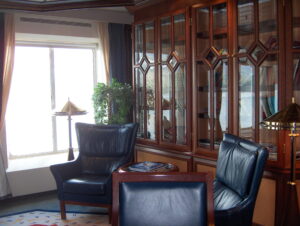 The buffet was huge; familiar eggs and ham and potatoes and breads and unfamiliar Norwegian dishes with fish as a starting point. My tablemates were chatty, with no one confessing to seasickness. In the library, aka bibliotek, while reading the BBC morning news, I fell asleep, sitting upright in a Norwegian blue leather chair in front of a picture window filled with Chilean fjords. It all seemed normal.
The buffet was huge; familiar eggs and ham and potatoes and breads and unfamiliar Norwegian dishes with fish as a starting point. My tablemates were chatty, with no one confessing to seasickness. In the library, aka bibliotek, while reading the BBC morning news, I fell asleep, sitting upright in a Norwegian blue leather chair in front of a picture window filled with Chilean fjords. It all seemed normal.
I skipped the morning lecture, Comorants: the Untold Story, but I photographed the remains of the Captain Leonidas, wrecked on the Cotopaxi Bank in 1957 (these were program events). 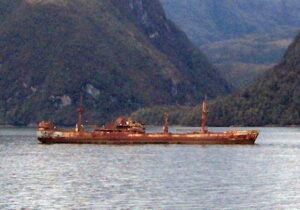 It was a rusty old ship, looking perfectly afloat, but going nowhere. Story is the Chilean pilot stepped away from the helm to eat lunch. A few minutes later, he heard a crashing noise, the claxons sounded, and as he rushed back to the bridge, he found the crew waiting at the lifeboats with their suitcases packed. The insurance claim was not paid.
It was a rusty old ship, looking perfectly afloat, but going nowhere. Story is the Chilean pilot stepped away from the helm to eat lunch. A few minutes later, he heard a crashing noise, the claxons sounded, and as he rushed back to the bridge, he found the crew waiting at the lifeboats with their suitcases packed. The insurance claim was not paid.
I sat in the Torghatten Salong for the rest of the morning, the gorgeous glass-enclosed lounge on Deck 7, watching the scenery as we passed through the treacherous Angostura Ingelesa (English Narrows). They made much of the fact that the current there is so strong no ship can pass through (by order of the Chilean government) except at slack tide. I assume our pilot was right on time; the waters were calm as glass and we were entertained by steamer ducks fluttering into takeoff, and otters swimming alongside.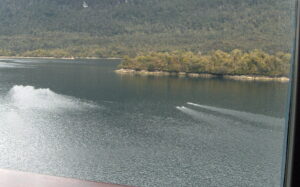
Lunch buffet (more fish), then Puerto Eden came into view, 20 buildings in bright reds and blues and yellows decorating the hills. Our groups were instructed to go to Deck 2 for boarding the PolarCirkels. My Dutch friend Will spotted me on the deck with my camcorder. “Go down to Deck 2,” he said, “I will help you get to your boat.”
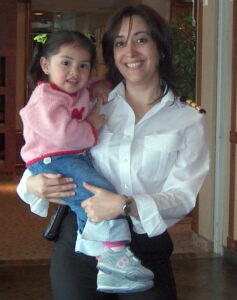 “I’m staying here,” I said. “I’m resting today.” Will went away, and I went downstairs. What I really wanted to do was to see the children!
“I’m staying here,” I said. “I’m resting today.” Will went away, and I went downstairs. What I really wanted to do was to see the children!
We had a pizza party with the beautiful children of Puerto Eden, a little town nestled between the mountains and the sea, with no roads in, no people nearby, and no industry of any kind.
Here, Santa comes by boat.
» posted on Friday, December 18th, 2020 by Linda Lou Burton
I Take You to the Ship!
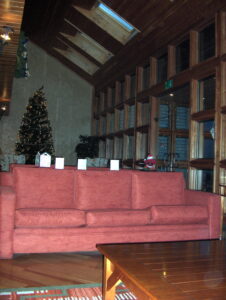 Christmas in Antarctica originally posted by Linda Lou Burton December 18, 2005 from Puerto Chacabuco, Chile – I found myself in the Loberias del Sur, address Carrera No 50, Puerto Chacabuco, Chile. Patagonia. The hotel perched high on a hill at the head of a narrow fjord, and every mountain around had ringlets of snow. http://www.loberiasdelsur.cl
Christmas in Antarctica originally posted by Linda Lou Burton December 18, 2005 from Puerto Chacabuco, Chile – I found myself in the Loberias del Sur, address Carrera No 50, Puerto Chacabuco, Chile. Patagonia. The hotel perched high on a hill at the head of a narrow fjord, and every mountain around had ringlets of snow. http://www.loberiasdelsur.cl
When Marco drove away, attention turned to me. “The dining room is here, Ms Linda, the sauna and gym are there,” he pointed. I looked around the lobby, wood expanded with windows opening the view to water, hills, and trees. At one end a Christmas tree reached twenty feet into the air; at the other, a fire flickered under a mantel decorated with green. “Let me show you to your room.” Fancy-schmancy and the carry-on were wheeled away, just down the hall, 114. What luxury! I wanted a bath. A nice, long, hot, steaming, bath. I dug into the luggage for clean clothes, hairbrush, toothbrush, my makeup. What luxury!
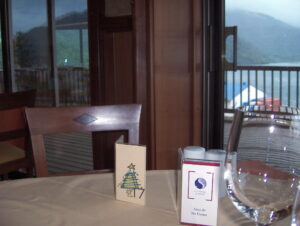 After the bath, the next need was food. The dining room was not far away, just across the stone-paved lobby, past the Christmas tree. A windowed wall at the edge of the hill, just above the pier where, tomorrow, my ship would magically appear. “8:30 AM,” I was promised. “It will be here.” I ordered salmon, grilled. Potatoes, in crème. Tomato salad. A glass of red wine. Food began to appear, appetizers, cheese, rolls dripping with butter, garlic, forks and plates, the table filled. I almost ate it all.
After the bath, the next need was food. The dining room was not far away, just across the stone-paved lobby, past the Christmas tree. A windowed wall at the edge of the hill, just above the pier where, tomorrow, my ship would magically appear. “8:30 AM,” I was promised. “It will be here.” I ordered salmon, grilled. Potatoes, in crème. Tomato salad. A glass of red wine. Food began to appear, appetizers, cheese, rolls dripping with butter, garlic, forks and plates, the table filled. I almost ate it all.
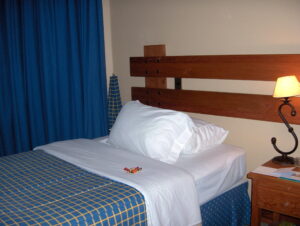 Only one need remained. Sleep. Back into my room, the bed turned nicely back, the pillow with two candies, the curtains drawn. My watch said 5 PM. It had been 35 hours since I got out of bed in Los Angeles. Time to change, I thought, and move into the Chilean realm. 10 PM, Patagonia. I set my watch.
Only one need remained. Sleep. Back into my room, the bed turned nicely back, the pillow with two candies, the curtains drawn. My watch said 5 PM. It had been 35 hours since I got out of bed in Los Angeles. Time to change, I thought, and move into the Chilean realm. 10 PM, Patagonia. I set my watch.
The telephone! “Ms Linda, your taxi is here!” My head was foggy with sleep. “I did not order a taxi,” I replied. “No! It is here. Please come!” I shook my head and tried to focus my eyes on the clock, but it made no sense. “Where do I need to go in a taxi?” I asked, puzzled. “To the ship! To the ship!” “I thought the ship would be here,” I mumbled, “just at the pier below.” “Yes, it is here. Now, hurry so you can go to the Park!” “I do not want to go to the Park!” I said, “I want to go to the ship. What time is it?” “8 AM! Please hurry!” “Let me come to the desk,” I said, not understanding anything at all.
Yes, it was 8 AM. I had slept for 10 hours, unmoving in the bed. I threw on yesterday’s clothes and hurried to the lobby. A man was standing at the desk, pacing foot to foot, in a hurry. I nodded to him and said “Who asked you to come?” “The tour company sent me,” he said, “to take you to the ship.” Yes, outside, just below the hill, I could see the red and black of the Nordnorge. “But I can walk,” I said. “And I did not expect it to arrive until 8:30.” “No! I will take you there,” he insisted. “Then give me an hour,” I said. “I’ll have to gather everything, I need to dress.” I didn’t have the starch to hurry any more.
“One ow-her,” he said. “I will wait one ow-her.”
Now I’m ready, fancy-schmancy zipped, teeth brushed, jacket on. The lobby bustled with my goodbyes. “Thank you for staying with us! Have a good trip! Please to come back!” I got into the taxi. He headed east, past a row of matching houses, corner turned, going away from the ship. “Where are you taking me?” I asked. “I want to go to the SHIP!”
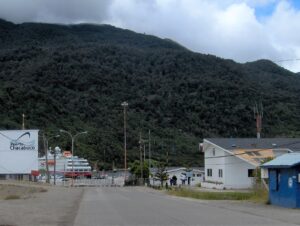 “Is this way,” he answered, making more turns through the tiny village. Then we started down the hill, past trucks, loaded with cargo, to the security gate. He mumbled answers, flashed a sign. “Nordnorge,” is what it said. They waved us through.
“Is this way,” he answered, making more turns through the tiny village. Then we started down the hill, past trucks, loaded with cargo, to the security gate. He mumbled answers, flashed a sign. “Nordnorge,” is what it said. They waved us through.
Around the buildings, workers busy with the morning chores, people boarding buses, headed for the Park. Ah! I remembered. The first shore excursion from the ship was to Aiken Park from Puerto Chacabuco. I saw those sights yesterday, and more! The gangplank. A tall Norwegian in uniform stood by, helping passengers find their buses. He spotted the taxi, waved, came to take my bags.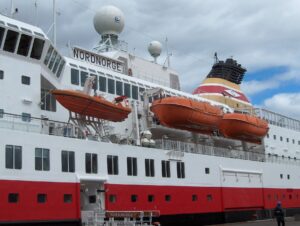
“Welcome aboard!” he smiled at me. “I am Morten, the ship’s Purser. We have been expecting you.” Up the gangplank, fancy-schmancy now lifted ahead of me, stop, let me make your card.
Morten lifted the digi-cam and snapped my photo. In a moment my check-in was complete. I donned the necklace that would be mine for the next two weeks; picture ID, passport number, date of birth, country of origin; plastic on-a-cord, serving as both room key and charge card, bar-coded for scanning every need.
» posted on Thursday, December 17th, 2020 by Linda Lou Burton
The Day I Crossed the Andes in a Taxi
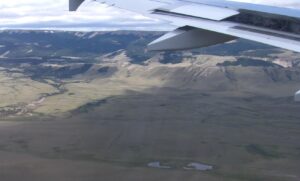 Christmas in Antarctica originally posted by Linda Lou Burton December 17, 2005 from Balmaceda & Puerto Chacabuco, Chile – I’d decided to keep my watch on Seattle time until I reached the ship. The plane landed in Balmaceda at 11:30 AM, coming in over green fields, little lakes, farmhouses, sheep. It was rural and sparse and, I soon discovered, windy. I asked the flight attendant to help me get my carryon bag down the steps but even on the ground I was caught sharply by the gusts.
Christmas in Antarctica originally posted by Linda Lou Burton December 17, 2005 from Balmaceda & Puerto Chacabuco, Chile – I’d decided to keep my watch on Seattle time until I reached the ship. The plane landed in Balmaceda at 11:30 AM, coming in over green fields, little lakes, farmhouses, sheep. It was rural and sparse and, I soon discovered, windy. I asked the flight attendant to help me get my carryon bag down the steps but even on the ground I was caught sharply by the gusts. 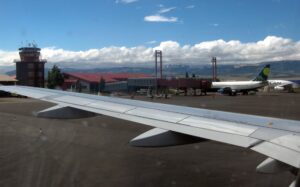
There was nothing near the airport, no town, no store, not even any houses. The baggage carousel was easy to spot in this tiny terminal, and I saw my fancy-schmancy circling as soon as I arrived. What I did not see was a uniformed Norwegian Cruise Lines official standing with a Voyage of Discovery sign. I wandered out into the main hallway, looking hopefully for something that would indicate a connection. “Taxi” I was offered, by several smiling hopefuls. I shook my head no and went to stack my luggage. Perhaps after a drink of water I could think what to do.
Then I heard my name.
I waved my hand and saw a young man, holding a slip of paper from which he was phonetically calling out the words he saw in print. “Leen-da?” “Yes! I’m Linda!” I yelled across at him and he immediately rushed to take my bags. He began pulling them towards the door until I put out my hand and ordered “Stop! Restroom!” He shook his head, puzzled. “No Eenglish,” he told me. “No Spanish!” I replied. I tried to think of a gesture that would indicate my need for a restroom stop. A woman on a nearby bench began to laugh as I continued “Restroom?” and he continued “No Eenglish.” She said something to him I did not understand and then he said to me “Bathroom?” I nodded, and he pointed around the corner. I left my bags on faith and went to pee.
When I returned my bags were gone. But there he stood, waiting to escort me out the door. I desperately needed a drink of water, but couldn’t bear to go through another round of misunderstandings. And where were my bags? He led me to a taxi at the curb, and opened the door. “What is your name?” I asked, extending my hand in handshake mode, “and where are we going?” Amazingly he seemed to understand, and offered his hand in return. “I am Marco,” he said.
We then began a game of Charades. “Where?” I pointed towards the road. “Ship!” he answered. “How far?” I asked, extending my hands apart. He shook his head. “How long?” I asked, tapping on my watch. “Two ow-hers,” he said, adding a distance in kilometers, which had no meaning to me.
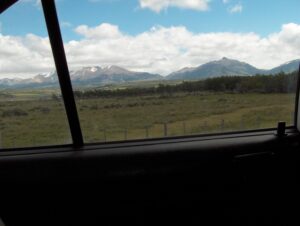 I was still curious about my bags and pointed to the trunk. “Can I have my black bag up front?” I asked. I don’t know if he understood, but he opened the trunk. My three bags were safely stowed, and I reached for the carryon, which he quickly retrieved and put into the back seat for me. I was beginning to feel a little more comfortable now, and after 30 hours with almost no sleep, welcomed any offered help. I settled in for the ride.
I was still curious about my bags and pointed to the trunk. “Can I have my black bag up front?” I asked. I don’t know if he understood, but he opened the trunk. My three bags were safely stowed, and I reached for the carryon, which he quickly retrieved and put into the back seat for me. I was beginning to feel a little more comfortable now, and after 30 hours with almost no sleep, welcomed any offered help. I settled in for the ride.
Marco had only driven two or three miles when he pulled the car to the side of the road and stopped. The highway was a smoothly paved two-lane, but there was no other traffic. “I wonder if anyone will ever find my body,” I thought, more resigned than worried. “I hope my brother remembers all the insurance policies and everything gets distributed correctly.”
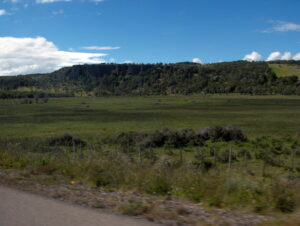 Marco turned to face me in the car, his face wrinkled in deep concentration. Then he gestured to the landscape and said “Big fire!” I looked around to see remains of tree trunks scattered on the hillsides, a sight of devastation like I had seen before. “Oh!” I nodded. “How long ago?” He looked worried at the question, and narrowed his eyes, thinking. Finally he answered “One hundred years!” I was excited at our progress, so asked another question. “What kind of trees? Trees? What kind?” More thinking, and then he smiled and shouted “El Pino!” “Pine trees!” I shouted back, laughing. We smiled at each other, satisfied. We’d had a conversation.
Marco turned to face me in the car, his face wrinkled in deep concentration. Then he gestured to the landscape and said “Big fire!” I looked around to see remains of tree trunks scattered on the hillsides, a sight of devastation like I had seen before. “Oh!” I nodded. “How long ago?” He looked worried at the question, and narrowed his eyes, thinking. Finally he answered “One hundred years!” I was excited at our progress, so asked another question. “What kind of trees? Trees? What kind?” More thinking, and then he smiled and shouted “El Pino!” “Pine trees!” I shouted back, laughing. We smiled at each other, satisfied. We’d had a conversation.
I took my camera from my pack and began snapping pictures of the countryside as we rode along. This seemed to please Marco, perhaps because I was interested in the place that was his home. He crossed the highway at a gravel turnout and opened the door for me. He grinned as he gestured towards a waterfall, splashing into a rushing stream. “Big fish,” he said. I snapped more pictures.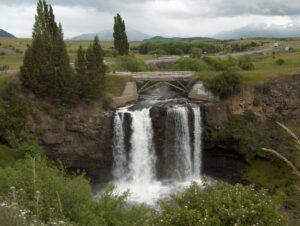
The landscape looked much like the wide open spaces of Wyoming to me, or eastern Washington state, and something very familiar was blooming everywhere. 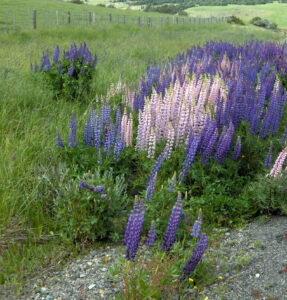 Lupine! Pinks and blues and purples and a soft cream color I’d never seen before. I tapped Marco on the shoulder and waved my camera as we passed a particularly beautiful field . “Flowers!” I said. He found a stopping place and let me out again. “So beautiful!” I said, “thank you.” Marco smiled.
Lupine! Pinks and blues and purples and a soft cream color I’d never seen before. I tapped Marco on the shoulder and waved my camera as we passed a particularly beautiful field . “Flowers!” I said. He found a stopping place and let me out again. “So beautiful!” I said, “thank you.” Marco smiled.
In about an hour we came to a town, identified by sign as Coihaique. This place I had read about in the tour materials. Maybe we were getting close? Marco drove through the downtown area, pointing out stores, circling the park where families were picnicking, children swinging. He stopped at a monument and pointed to the figures.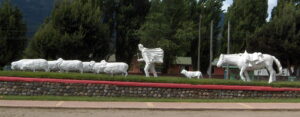
Was his English getting better? Or was my ear finally getting the Spanish? I’m not sure, but I seemed to absorb what was going on around me. At the gas station, I commented on his car. “Toyota!” I said. “I have a Toyota too.” “Good car,” Marco said.
We changed highways in Coihaique, and the landscape became steeper and more rugged, the road more challenging. Marco stopped at a lookout point high on the hill so that I could see the town laid out in the valley below. It reminded me of a place I once stood in Yosemite National Park. Now here I was, in the midst of the Andes.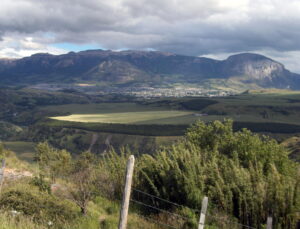
A few miles more down the road, Marco stopped to show me a rock outcropping that extended for several miles, high above the valley. “Great Wall,” he said. “Oh,” I finally understood, “the Great Wall, like China.” He nodded. Language is a great wall, I thought to myself. I wished that I could ask Marco about his family, his work, the places he had been. But I did not know how.
The road wound down now, and suddenly around a curve there was a road block. Marco pulled his taxi to the side of the road as the uniformed officer approached. Had we been speeding? I was not sure. Marco began to pull out papers and answer questions. All I could see was the elbow-length white leather gloves on the officer’s hands. Then he waved us on. “Normal?” I asked. “Sometimes,” Marco replied.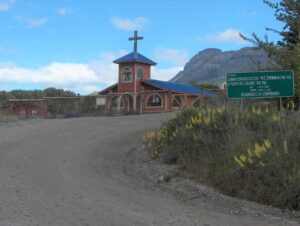
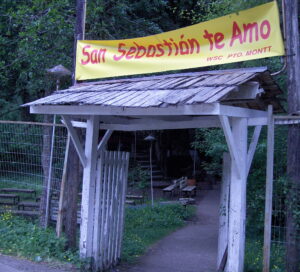 There was a river to our left. The river valley flattened and widened and campsites began to appear. I spotted obvious places for fishing and rafting. It reminded me of the Ocoee River in eastern Tennessee. “Simon River,” Marco indicated to me. “Big river.” We stopped at two more waterfalls, and two roadside altars. “San Sebastian,” Marco said, “saint of travelers.” I snapped more pictures.
There was a river to our left. The river valley flattened and widened and campsites began to appear. I spotted obvious places for fishing and rafting. It reminded me of the Ocoee River in eastern Tennessee. “Simon River,” Marco indicated to me. “Big river.” We stopped at two more waterfalls, and two roadside altars. “San Sebastian,” Marco said, “saint of travelers.” I snapped more pictures.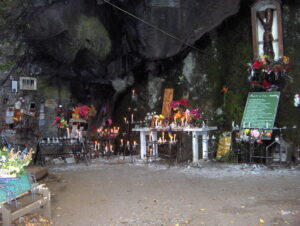
Another hour had passed, and we were approaching another town. Puerto Aisen, I saw on a sign. A large bridge loomed ahead. “Simon?” I asked, as we crossed over. “Aisen,” Marco said back. I spotted a fortified building on the left. “Jail?” I said, hoping he’d reply with the Spanish word. “Bad pipples,” he laughed.
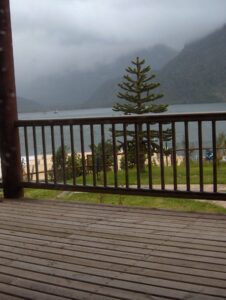 Now there was a large body of water on the right. “River?” I asked. “Ocean,” he said. Ocean! Was I almost to my ship? The answer was yes. In ten minutes more we drove into a small village surrounded by ice-capped mountains. Puerto Chacabuco, at last. Marco stopped the taxi in front of a beautiful building, wood and glass overlooking a narrow channel of water. There was no neon marquee, but I was sure I’d reached a destination of sorts. A handsome young man in a black uniform with golden epaulets met us at the door.
Now there was a large body of water on the right. “River?” I asked. “Ocean,” he said. Ocean! Was I almost to my ship? The answer was yes. In ten minutes more we drove into a small village surrounded by ice-capped mountains. Puerto Chacabuco, at last. Marco stopped the taxi in front of a beautiful building, wood and glass overlooking a narrow channel of water. There was no neon marquee, but I was sure I’d reached a destination of sorts. A handsome young man in a black uniform with golden epaulets met us at the door.
“Welcome Ms Linda! We have been expecting you! Your room is ready!” he said, in English. I turned to Marco. “Thank you so much, that was such a beautiful ride,” I said. Then I said to my host, “Has he been paid?” “Oh yes, the tour company has taken care of that,” my host replied. “He is free to go now.”
“Then please tell him how much I appreciate everything he did for me, please let him know it was very good, and please help me to give him a very good tip.” I pulled out all of the Chilean pesos I had and laid them on the counter. The host removed some bills and spoke to Marco in Spanish. Marco nodded as took the money. Then he shook my hand, smiled, and drove away.
Read More
Balmaceda, Chile – https://www.rutadelosparques.org/en/balmaceda/
Coyhaique, Chile – https://www.rutadelosparques.org/en/coyhaique/
Puerto Aisen, Chile – https://www.rutadelosparques.org/en/puerto-aysen/
Puerto Chacabuco, Chile – https://www.rutadelosparques.org/en/puerto-chacabuco/
» posted on Thursday, December 17th, 2020 by Linda Lou Burton
Jack Daniels and the Dunkin Donuts
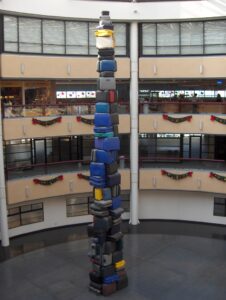 Christmas in Antarctica originally posted by Linda Lou Burton December 17, 2005 from Santiago & Puerto Montt, Chile –It took one hour and 25 minutes to get to the glassed-in box that housed Policio, Immigracion. I had my passport in my hand, a friendly I’m-not-dangerous expression on my face. “Have you been here before?” I was asked, as she flipped through my passport pages, which were as yet free of any mark. “No, my first time,” I replied.
Christmas in Antarctica originally posted by Linda Lou Burton December 17, 2005 from Santiago & Puerto Montt, Chile –It took one hour and 25 minutes to get to the glassed-in box that housed Policio, Immigracion. I had my passport in my hand, a friendly I’m-not-dangerous expression on my face. “Have you been here before?” I was asked, as she flipped through my passport pages, which were as yet free of any mark. “No, my first time,” I replied.
“Go pay. One hundred dollar.” I knew they would collect a hundred US dollars as I entered, I had three crisp fifty-dollar bills folded and ready in my passport case, one for good measure. But there was no sign anywhere indicating that it would be anywhere else but at the gate. “Where?” I asked, more than a little frustrated. She pointed to an area behind me, where there had been no line. I had observed none of the other passengers standing there during the long wait.
I trudged back across the nearly empty room, where three ladies merrily chatted away. “Pay here?” I asked. She had me slide my passport through the slot and then said “One hundred dollar.” I passed the money through. She stamped the passport, printed a receipt, and stapled it inside.
I trudged back to my original waiting line, ready to get aggressive about position. I edged my wheelie carry-on to the yellow line, like a runner at the starting gate. Go! I’m certain now I’m good. Passport to the glassed-in booth, receipt poking out the side. She flipped through again, glared at me. “You did not fill out the papers! Go back!” I had not noticed two small papers stuck inside, that asked for name and address and purpose of visit. “Can I please sit down to fill this out?” I asked, noticing a bench just a few feet past her. My knees were begging me to SIT. “NO! GO!”
I moved behind the yellow line again, first in place, determined not to let anyone ahead, hastily scribbling in the pre-measured boxes demanding name/address/married/single/widowed/divorced. ????? I thought. @#%$^&&#$^ I also thought. Now I’m up again! Go! Passport into the glassed-in booth, papers complete, fee paid. She slapped the stamp against the page and thrust it back to me. “Welcome to Chile,” she said.
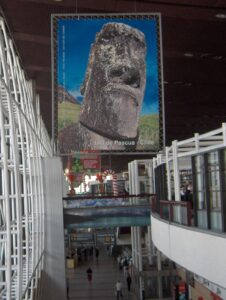 I saw a sign pointed to the baggage area, which wound through the duty-free shop. Now I’m in the main terminal, crowded with people pushing, shoving, hauling carts piled high with boxes, bags, children. I find a sign for Flt 601, and there below, tossed already onto the floor, are fancy and schmancy, waiting for me. No other luggage is in sight, long gone, to somewhere.
I saw a sign pointed to the baggage area, which wound through the duty-free shop. Now I’m in the main terminal, crowded with people pushing, shoving, hauling carts piled high with boxes, bags, children. I find a sign for Flt 601, and there below, tossed already onto the floor, are fancy and schmancy, waiting for me. No other luggage is in sight, long gone, to somewhere.
Good fortune! The carts are free, parked here and there. I grabbed a cart and piled my belongings together, all my stuff, at last! I headed for the gate. Or so I thought. There was a line of carts poised to go through, oh no I can’t believe it, CUSTOMS. I get in line again, leaning wearily against my cart. Fifteen minutes, edging forward, finally to the x-ray machines, a gentlemen is standing there, collecting papers. PAPERS? What papers? I ask. I did not see any papers! He handed me a sheet, “Here Senora, to declare,” he kindly stated. Many questions, name, address, widowed/divorced/married/single, did I bring plants or animals into the country? No. I handed him the completed form, and he stuffed it into a stack on the counter, never glancing at it.
“Go now,” he said, nodding at me. My bags disappeared into the x-ray machine, but I held possessively onto my cart.
On the other side, a sign in blue-and-white loomed overhead. Spanish, of course, but I could make it out. SMOKING CAUSES CANCER was the basic message. It pictured a person looking very ill. I pushed my now x-rayed baggage forward, past the waiting taxi drivers, onto the elevator, up to the Departures tier. Everything smelled of cigarettes.
And what did I see? LINES. Nacional. Puerto Montt, Balmeceda. I did not know what fate called next, but, I could not stand in line. I had to sit. I had to rehydrate. The vending machines asked for coins I did not have, could not read. I spotted stores, just around the corner. A bar! “Ginger ale?” I asked. “Si,” replied the bartender. “Ice?” I ventured, hopefully. “Ice,” he replied. I sat down. It was 3 AM by my watch, but 8 AM in Santiago. A mustached blond man at the next table ordered coffee, lit a cigarette.
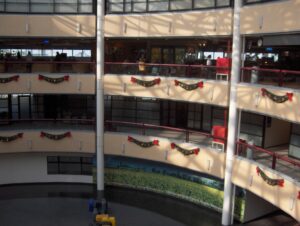 I sipped my ginger ale, watched the people passing by. On the wall, a sign advertised Jack Daniels Tennessee Whiskey. Hm! I recalled my tour of the place, my lunch at Bobo’s, in a tiny town in the Tennessee hills. The next store was a music store, plastered with posters of Jennifer Lopez. Just past that, Dunkin Donuts was the spot for a Chilean breakfast.
I sipped my ginger ale, watched the people passing by. On the wall, a sign advertised Jack Daniels Tennessee Whiskey. Hm! I recalled my tour of the place, my lunch at Bobo’s, in a tiny town in the Tennessee hills. The next store was a music store, plastered with posters of Jennifer Lopez. Just past that, Dunkin Donuts was the spot for a Chilean breakfast.
“No matter how far we go, we’re never very far away,” I thought.
Fortified now. Back to the lines. I handed the ticket agent my passport, she asked my destination. “I do not know,” I replied, ‘but my name should be in your computer somewhere.” I explained about the tour company, the delay, the arrangements. She called for a supervisor. They talked for a while, in Spanish of course. I waited.
Then she began to type. “You will come back later to see your gate,” she said, “it is too early now to know.” “Then you see my name?” I asked. “Si.” “Where am I going?” I asked again. “Balmeceda,” was the answer, “at 12:55.” She pasted new tags on my luggage, threw it onto a belt. Suddenly, I had a boarding pass in my hand.
I pushed my cart outside into the Santiago air. It was sunny with smog, and pleasantly warm. “Santiago,” I thought, “is the same latitude as Birmingham, Alabama. So, this would be like a Birmingham day in June.” More or less. I snapped a few pictures of the rounded brown hills and went back inside.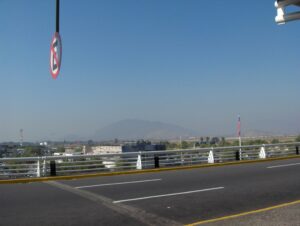
Now to stay awake until noon. My head was drooping. I decided to eat. Back to the café, a milkshake now, a fruit tart. How to pay? How to tip? I blundered through.
Security at Santiago was easy. Finding my gate was easy. Or, is everything routine now? Seated, with two hours to wait, I fell asleep. But still, I heard the call. Onto the plane and a window seat! A couple to my right. She was so friendly, now I know I cannot sleep. She asks where I am going, listens to my tale. “We are going to Puerto Montt,” she said. “That is my home. We were delayed in Miami ourselves, our luggage lost. We’ve been filling out papers.” Now I knew, we were kin! “What were you doing in Miami?” I asked. “Oh, we live in North Carolina,” she replied. “My husband is from Alabama.” He smiles and nods at me. Maybe our paths have crossed before, in a grocery store, at a football game? Small world thoughts again.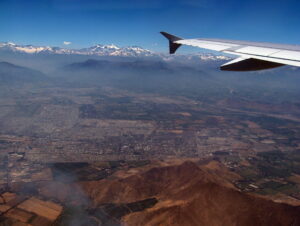
The sky was clear as we left the ground, and suddenly I saw the city of Santiago below. My seatmate leaned to look with me, described the city. She knew the route, pointed out the mountains, the lakes. Osorno Volcano I recognized from the pictures I’d seen. She verified I was correct.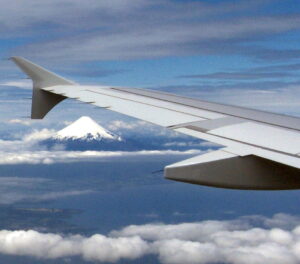
The plane glided over lakes, water, resorts, boats, houses, trees. We were on the ground and my friendly companions departed. “Have a wonderful Christmas with your sister,” I said.
“Good luck in Balmaceda,” they said to me. “We hope you catch your ship.”
» posted on Thursday, December 17th, 2020 by Linda Lou Burton
Fatal Mistake
Christmas in Antarctica originally posted by Linda Lou Burton December 17, 2005 from Santiago, Chile – The tiny screen in front of me was my lifeline. Set on GPS, it showed my location as if I were looking from the cockpit, with the jagged peaks of the Andes on my left. Other screens were map-like, with city-dots identifying the political name for what was there, our tiny-toy plane an imaginary figure above the world, creeping south. Occasionally the screen flipped to a statistics page. Velocidad. Altura. An English menu was offered but it took so long to download I decided to stick with the Spanish version. I determined we were flying at 35,000 feet with a ground speed of 508 mph.
I jotted down map-names. Trujillo. Rio Branco. Cuzco. Arequipa. Arica. Huancayo. Juliaca. La Paz. Iquique. Antofagasta. Galapagos Islands. Machu Picchu. Ascencion. Vina del Mar. Oruro. Totori. Calama. Salta. Pachacamac. Trinidad. Sucre. Copiapo. Mumahuaca. Concepcion. Cordoba. Santiago. Maldonado. Balmeceda.
I believe Balmaceda was a name Par said to me as a possible destination after Santiago. But he was not sure. I must wait and see.
They served food again after our stop in Lima. An omelet, tasty and hot, some fruit. A cinnamon cake. “You can have my melon,” Sofia said. “If I can have your grapes.” It was a perfect swap. The man on my left was sleeping. But Sofia and I talked. She was born in New York, to Argentine parents. Her father worked for Citibank so was transferred twelve times as she grew up. Elementary school in the Philippines, high school in Greece. “I followed my ex-boyfriend to LA,” she told me, “and now I do not want to leave. But I have so many choices.” “Where is your ex-boyfriend?” I asked. “He’s moved on,” was the reply.
I could not sleep. My brain was still on Seattle time. It was 10 PM when we left Lima, with three more hours to fly. Midnight, and my Friday became my Saturday, but outside it was already light.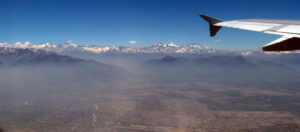
I finally made it to Santiago, 48 hours behind schedule. I waited till the plane was nearly empty before I started down the aisle. It was 2 AM on my watch, 7 AM on the ground. Next step, get in line at Customs. Fatal mistake, waiting so long to leave the plane. There were at least 300 people ahead of me. I wished I’d slept. I wished I had water. I wished for a chair.
My next invention, a fancy-schmancy travel bag on wheels with a pop-down seat.
» posted on Wednesday, December 16th, 2020 by Linda Lou Burton
Until You Get on the Plane
Christmas in Antarctica originally posted by Linda Lou Burton December 16, 2005 from Lima, Peru – The yippy dogs kept at it all night. The planes kept coming in. But that was OK, because I was going to Santiago. I slept despite it all.
6 AM wakeup. I called Par to give him the news. “I’ll be in Santiago no later that 9:45 AM on Saturday,” I said. “What arrangements can you make to catch me up to the ship in Puerto Montt?”
Par did not know. “But, I will get you there,” he assured me. “Call me when you know which plane you will get on.”
I dressed and packed, confident, though much uncertainty lay ahead. It was going to be a good day. In the shuttle, I heard a familiar sound. Three people, together, talking Southern. I had to ask where they were from. “North Ca-ro-lin-a,” was the answer. “Montreat College. We’re he-yah to play basketball.” We exchanged stories and wished each other luck with what was ahead.
A light bulb went off in my head about my luggage. A cart! “Please let me out by the CARTS, instead of LAN’s gate,” I asked the driver. I’m finally getting smart, I thought to myself, as I piled four pieces on one easy-to-roll cart.
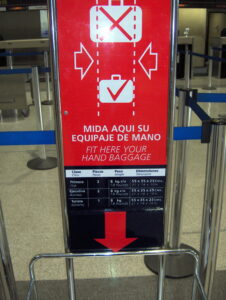 Inside, I began working through the line-up maze. “Please do not fly today and we will give you a ticket anywhere we fly,” was the first approach. “No thank you,” I replied. “I am flying today.”
Inside, I began working through the line-up maze. “Please do not fly today and we will give you a ticket anywhere we fly,” was the first approach. “No thank you,” I replied. “I am flying today.”
“Put your luggage here,” I was instructed. A swarthy man x-rayed my bags, rubbed the outer surface, then tagged them with a sticker of approval. Clunk, they went into a pile with other bags, all much larger, heavier, more beat-up than mine. What a travel baby I am, I thought.
At the counter, I asked for standby. A ticket was prepared, but I was assured I would not get on the plane. “We are overbooked,” I was told. “I will wait,” I answered. “And, if you cannot seat me, you can endorse my ticket to American. I have a seat reserved there.”
This caused a great flurry of protest.
No! Your ticket is not endorsable!
Yes! Magdalena looked it up yesterday!
No! You must call reservations!
Yes! I did! That is who said!
No! We will not endorse this ticket!
Then, I will know that I will get on this plane today, I said.
With my standby ticket in hand, I moved across the way to Security.
Serpentine. Serpentine. So many children traveling with parents. Children, rushing, languages, colliding, everyone, pushing. All possessions in a tub. Everyone watching everyone. Passport. Boarding Pass. Hurry up. Move it on. Gate 115.
I called Par in New York. “I am standing by the gate,” I reported. “What arrangements have you made?”
“Until you get on the plane, we cannot make arrangements, because we do not know what time you will arrive. Once you are on board, we will proceed with the next ticket.”
“How will I know what to do? Will someone meet me at the gate in Santiago?”
“No, no one can meet you there. You will have to manage yourself. Go to the ticket counter and ask them what ticket they have in the computer for you. It will be ready. Wherever you go next, someone will meet you and take you to the ship.”
Announcements, announcements, noises blaring, it was almost time to begin boarding. “I have to go!” I said to Par.
I sat. I waited. Row by row the numbers were called, the line grew smaller, and smaller. Finally, there were only 12 people left standing. I inched towards the counter, listening.
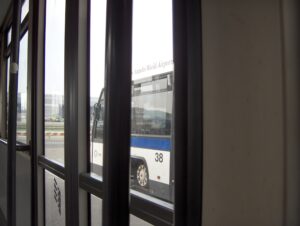 And then it happened. They called my name. I stepped forward, and accepted the boarding pass in awe. Seat 16J, it said. Get on Bus 38, they told me.
And then it happened. They called my name. I stepped forward, and accepted the boarding pass in awe. Seat 16J, it said. Get on Bus 38, they told me.
I stepped outside, boarded a bus. A few more people came, and then we were driven several miles across runway and pavement, to a distant loading area.
16J would have been a window seat. Of course that part was too good to be true.
They put me in the center seat of the center aisle. But I did not complain.
Just after takeoff, I was fed. Pasta, bread, salad, water, even dessert. No food like that on domestic flights! Maybe I can even sleep, I hoped.
There was a mini-screen in front of me, offering news, videos, games, even a GPS map. I tuned into the map and watched my progress south.
At 6:30 PM, Pacific Time, I finally made it across the equator. I took a deep breath and closed my eyes.
We got to Lima at 9 PM. One stop, passengers off and on, refuel, clean the toilets. By now I’ve met Sofia, in the seat to my right. She was headed for Buenos Aires, to spend Christmas with her family. We watched each other’s things, stretched our legs, walked to the restroom.
The door was open at the back. I caught a breath of dark Peruvian air. It was humid, 74 degrees.
» posted on Tuesday, December 15th, 2020 by Linda Lou Burton
Don’t Moan, Get on the Phone
Christmas in Antarctica originally posted by Linda Lou Burton December 15, 2005 from Los Angeles, California, United States – I had a plan. First, a 6 AM wakeup call. That’s when the insurance company in Kansas City would answer their phones. I got through to a fellow named John. The bottom line, according to John, was that I was covered for $100 per day UP TO a max of $500 for “mechanical breakdown” problems. Nothing more. “Now, if you were SICK,” he continued, “we’d cover full price.” Thank you John.
Next a call to the cruise line in New York. Par (pronounced Pair) answered. I told him what I’d learned about the insurance, and assured him I was heading back to the airport soon to get in the standby line. “If I get to Santiago today,” I said, “I can join the tour at the airport as they leave for Puerto Montt.” He agreed that was a great plan. “But if I DON’T, what are my alternatives?” I asked. He would talk to his manager and find out. “I’ll call you back at 7:30,” he promised.
I showered and dressed and zipped up the carryon. Par called at 7:30, with booking agent Mark on the line. “We offer you a fresh tour, starting over from day 1,” they said, “if you can’t fly out today.” I pondered that option. I asked about other tour dates. Nothing else they had would get me “down south” for that treasured First Day of Summer. “I really, really, really need to make this tour,” I said. “I’ll see if I can get to Santiago one way or another.”
“If you do,” Par said, “we’ll catch you up to the tour at some point along the way.”
AHA! A surge of hope opened my eyes wide and set me smiling. “Then let me hang up and get back in line!” I hastily said goodbye to Par and checked out of the hotel.
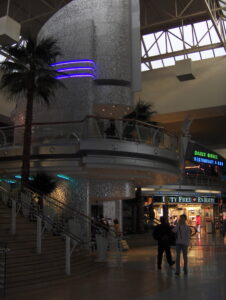 I was the only passenger on the shuttle back to LAX, and the driver was in a talking mood. His name was Reynaldo. “I’m from Guadalajara,” he said, “but I’ve lived in LA for 18 years.” He described Guadalajara to me, talked about the cost of living. “I’m going back when I save some money,” he said, “where the pace is easier.” He let me out at the busy LAN Departures gate and wished me luck.
I was the only passenger on the shuttle back to LAX, and the driver was in a talking mood. His name was Reynaldo. “I’m from Guadalajara,” he said, “but I’ve lived in LA for 18 years.” He described Guadalajara to me, talked about the cost of living. “I’m going back when I save some money,” he said, “where the pace is easier.” He let me out at the busy LAN Departures gate and wished me luck.
Inside, all 16 stations for LAN Chile were closed. A sign promised Open 8:45. I found an elevator and a McDonald’s and ate the Big Breakfast for $3.49. While I drank my coffee the speaker announced, on a 7-minute repeat schedule “You are not required to give money to solicitors.” A man laid a paper on my table, requesting money. “I am deaf,” it said.
Back in line at 8:45. A gentleman in a LAN Chile uniform approached to ask if I would give up my seat on the plane today. “We are overbooked,” he said, “and we’ll give you a ticket to anywhere we fly for use any time this year if you don’t fly today.” I thanked him for the offer, and took that as a Very Bad Sign for a Standby. At the counter, they said No Way Jose. Or, something that meant the same thing. “Try American,” they offered. “Or, come back manana. We have two flights tomorrow so you have two times chance.”
“You still have my luggage,” I said, “What should I do about it?”
“You should prolly take it home,” I was told. “It is in an open area.”
OPEN AREA? NOT LOCKED? That factoid has escaped notice the day before. My fancy-schmancy wheelie luggage had sat in an unlocked area in the Los Angeles airport for a day??? Yikes.
I requested that they bring it forth herewith, and that, surprisingly, happened quickly.
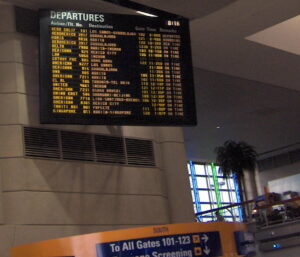 Now I’ve got the dreaded four-bags-on-two-wheels situation, and a walk to American Airlines in the next terminal. My determination fizzled, but on I marched, bump dabump dabump. There were 500 people in line at American. That I could see. The serpentine lines wound to a balcony upstairs that was completely out of view. The Big Breakfast had not prepared me for that. I found a bench outdoors, under the blue Los Angeles sky (only slightly dinged by brown smog and cigarette puffers), and watched the tour buses drive past, headed for Disneyland.
Now I’ve got the dreaded four-bags-on-two-wheels situation, and a walk to American Airlines in the next terminal. My determination fizzled, but on I marched, bump dabump dabump. There were 500 people in line at American. That I could see. The serpentine lines wound to a balcony upstairs that was completely out of view. The Big Breakfast had not prepared me for that. I found a bench outdoors, under the blue Los Angeles sky (only slightly dinged by brown smog and cigarette puffers), and watched the tour buses drive past, headed for Disneyland.
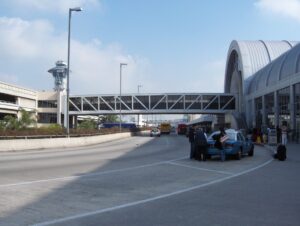 Where else do I want to go? Hmmm, I haven’t been to Death Valley yet, or the Channel Islands. How about Christmas in Santa Barbara? I’ve even got relatives there. Maybe I could rent a car and drive home, enjoying the beauty of the Pacific Coast . Rats, I remembered, it’s December and the passes are already getting bad in the Oregon mountains.
Where else do I want to go? Hmmm, I haven’t been to Death Valley yet, or the Channel Islands. How about Christmas in Santa Barbara? I’ve even got relatives there. Maybe I could rent a car and drive home, enjoying the beauty of the Pacific Coast . Rats, I remembered, it’s December and the passes are already getting bad in the Oregon mountains.
I finally wrangled the luggage back inside, found the hotel phone bank, called for a shuttle, and trekked back outside to the Red Zone to wait for a ride.
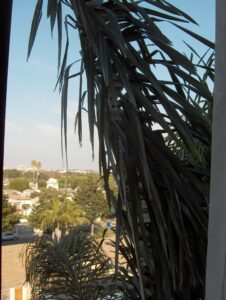 This time they gave me a larger room, much nicer, for the same rate. Did they feel sorry for me? I was getting the bedraggled look, for sure. Although it was on the 4th floor, a palm tree brushed against the window. Down below, a back yard, a swing set, a barbecue. So peaceful, I thought. Suddenly three little doggies ran from the patio to the shrubbery, in a yipping chase. In the sky above, JAL was coming in for a landing. Three yippy dogs and an international flight path. Oh happy day. I kicked off my shoes and rubbed my blistered feet.
This time they gave me a larger room, much nicer, for the same rate. Did they feel sorry for me? I was getting the bedraggled look, for sure. Although it was on the 4th floor, a palm tree brushed against the window. Down below, a back yard, a swing set, a barbecue. So peaceful, I thought. Suddenly three little doggies ran from the patio to the shrubbery, in a yipping chase. In the sky above, JAL was coming in for a landing. Three yippy dogs and an international flight path. Oh happy day. I kicked off my shoes and rubbed my blistered feet.
A voice inside instructed: Don’t moan, get on the phone.
First, American Airlines. YES! YES! There is ONE SEAT left on the Santiago flight tomorrow! YES! She booked the flight, gave me the confirmation, and instructed me to call LAN Airlines so they would endorse the ticket.
Second, LAN Chile Airlines. “My name is Magdalena and I would like to help you,” in a beautiful, lilting accent. I told her the story. I asked her to endorse the ticket to American. “You are both a part of One World,” I said to her, hoping that would engender the spirit of cooperation. She asked for my ticket number. “I will read the regulations,” she promised. Soon she was back. “The ticket may be endorsed,” she said. “But they will have to do it at the counter tomorrow, I cannot do it by phone.” “Thank you, Magdalena! You have been so helpful!”
What a plan I have now! Three options! I can Standby for the 12:35 LAN flight. I can Standby for the 1:05 LAN flight. If I don’t make either of those, I can have them endorse the ticket and go to American for the 3 PM flight. Either way, I get to Santiago in time to join the tour, fly to Puerto Montt, and get to the ship in time.
My life is perfect. It is too late to call New York and give Par the news. I brush my teeth and head next door to Casa Gamino, ready for guacamole, ole.
» posted on Monday, December 14th, 2020 by Linda Lou Burton
United, We Stand
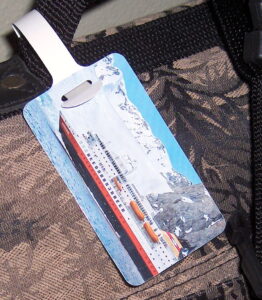 Christmas in Antarctica originally posted by Linda Lou Burton December 14, 2005 from Los Angeles, California, United States – The shuttle was right on time. 3:15 AM, just as promised. The van was already filled with middle-of-the-nighters getting ready to travel places, see things, do stuff. A couple headed for New Zealand thought THEY had the market on distance. Ha! I’m going to Antarctica. That was the trump card, for sure.
Christmas in Antarctica originally posted by Linda Lou Burton December 14, 2005 from Los Angeles, California, United States – The shuttle was right on time. 3:15 AM, just as promised. The van was already filled with middle-of-the-nighters getting ready to travel places, see things, do stuff. A couple headed for New Zealand thought THEY had the market on distance. Ha! I’m going to Antarctica. That was the trump card, for sure.
An icy fog swirled around us as we hurtled through the dark, headed for SeaTac airport, AKA, Flying Carpet Central. “What do you do in case of bad weather,” I asked, fearful we might not make the plane on time. “Oh, I have studded tires,” was the reply. “I always get you there.”
Inside. In line. Bags checked to Santiago, Chile. Boarding pass. Rode the shuttle to another terminal. Got coffee. Got muffin. Got newspaper. Waited.
5:40 AM. Got on the plane!! Stowed carryon. Found seat. Buckled up. Waited.
6:00 AM. “We’re going to put a little deicer on the wings,” said the pilot. “Don’t be alarmed by the smell.” Mysterious vehicle with shiny spotlight dumped something all over the wings. Waited.
6:15 AM. Taxied to runway. Waited.
6:30 AM. Screechy clunky noise from wing. More noise. More noise. Pilot announced “We are computer driven and the computer is acting up. We’re trying to get it fixed.”
7:00 AM. Sorry can’t fix, have to go back to terminal. We’ll know something by 8 AM. Ride back to terminal. Wait.
8:00 AM. Sorry folks, they can’t seem to fix it. Get off the plane and go have breakfast on us. Voucher worth $5.50. Come back at 9:00.
Got in line to contact LAN Chile Airlines. Please United, see if I can make another connection. Answer. NO. Wait and see.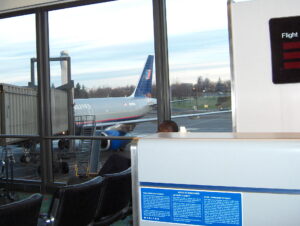
9:00 AM We have a good plane. Please reboard. By now the passenger load was much lightened. Lots of people were headed for Hawaii. Lots of people missed connections. Mucho groucho. THIS IS CRAP was the most frequently heard comment in the rebooking line. Hey, when you’re headed for relaxation, you don’t want anything to slow you down. Right?
Pretty little Charlie, a two-year-old blond sweetie traveling with her mother and grandmother, did not reboard. I did.
Back in my window seat. Young man has returned to seat beside me. He’s dressed in T-shirt and toboggan; tattoos of roses-on-trellises grow from his wrists up his arms. “I missed my appointment in LA,” he told me. “I had a job interview.” “Bummer,” I said, and told him of my flight fright. “If I miss the flight to Santiago, I miss the boat!” “I’ll help you get your carryon when we land,” he offered.
9:30 AM we were in the air, leaving Seattle behind. Could I make the connection?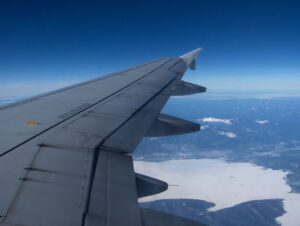
11:45 On the ground in LA. How long does it TAKE to open the door? “Go to Customer Service and they will help you find the LAN Chile desk,” offered the flight attendant. “I have no idea where it is.”
RUN. Ah, Customer Service desk. 27 people in line for one Customer Representative. Quick multiplication in my head. 27 people times a conservative 5 minutes each equals 135 minutes. Plane leaves in 50 minutes. I kept running.
Saw a uniform. “Help! I need to find LAN Chile! Can you help me?” Gentleman stops, yes he will help. “Tell them I’m here! Tell them I’m running!” He went away to make a call.
Back. “I cannot get through to them. You should go directly to the desk.” He kindly walked with me down the escalator, to the door, motioned towards the shuttle bus. “Oh, that one is just leaving, there’ll be another in 10 minutes,” he said. “I don’t have 10 minutes to spare!” He pointed left, drew me a diagram, “It’s only a 5-minute walk.” ANOTHER BUILDING. A different terminal entirely!
I began running (in my best slow hobble-walk), pulling my sturdy TravelPro carryon with the in-line skate wheels that drives like a dream. I’m running backwards in the alphabet, according to the overhead signs. From United. By the time I got to Delta my chest was pounding and I was drenched in sweat. Finally then, American! The end of the terminal. Open spaces. Next building.
It was stinky. Really stinky. Cigarette puffers lined the route, nervously sucking and blowing smoke, smoke, more smoke. There was a sign ahead. LAN. I bumped down the brick walkway, into the door, I’m on the wrong level! I need Departures and I’m still on the Arrivals tier. Elevator. Run.
I could see the counter! It was now 12:10 PM. I still had 25 minutes. But which line? Rows of tape separators on little chrome posts made a maze of pathways. A guard looked up to see if I’m a dangerous intruder. “LAN! For a 12:35 flight!” I waved my ticket in the air. The guard jumped up, ran, “Come with me!” I followed through the maze and he led me straight to the counter. Which was strangely empty. He called and someone appeared from behind a Do Not Enter door. He explained in Spanish. She shook her head. CLOSED. Plane is full.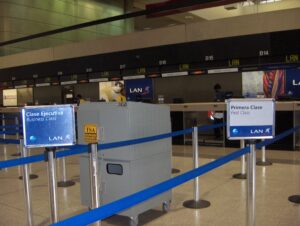
I explained in English. Plane was delayed from Seattle. Pant pant. Must get on this flight. Pant pant. Here is my ticket. Pant pant. Please help.
“Ees not my fault,” was her reply. How many times would I hear that statement before the day would end?
I spent 10 minutes begging to be allowed onto my plane. I spent 25 minutes waiting for the supervisor to return from the departure gate. Pregnant and obviously tired from the morning rush, she kindly described to me the details of why it took 3 hours to board – security, holding pen, many busloads to departure area, on and on. “Please come back manana,” she concluded. “We’ll try to get you on. But, eet too is full so, maybe not happen.”
I called Norwegian Cruise Lines in New York and explained what happened. “Please help me,” I implored. “Well, it’s not our fault that you missed your flight,” was the answer. “The trip officially begins in LA.” “I have trip insurance,” I stated. “What will it cover?” “Call the insurance company and see,” I was told.
I went outside and caught a shuttle back to the United counter. Waited in line for one hour. Finally reached the counter and Jo Anne, my first angel of the day. Jo Anne sold tickets, mostly to people who were “dis” connected, like me. She dealt with lots of tears. What flights go to Santiago? We can fly you to New York, and then to Miami, for tomorrow’s Santiago flight? No seats from Miami. We can fly you to Mexico City, then to Santiago? No seats from Mexico City. We can fly you to Toronto, then on Air Canada to Santiago? Seats available, but flight arrived too late to catch up to the Tour.
“I guess I’ll have to stay the night in LA,” I finally told her. “Can you get me a hotel voucher?” “Absolutely!” she assured me, and went away to do so. Meanwhile, beside me, a woman wept in French. They called for an agent who could converse with her. Passport expired, how could she get home? At least, I was close to home.
Jo Anne returned. She was in tears! Now I was the consoler. She could not get me a hotel voucher, she said. “And that’s not RIGHT! We delayed you and we should help you now. But my supervisor says it’s not our fault that you didn’t make the connection. They won’t help you!” “Don’t cry Jo Anne,” I replied, “you worked so hard to help me. It’s not your fault. Please don’t cry,” I repeated. “That’s such a beautiful pin you are wearing,” I said, an afterthought. Jo Anne smiled and wiped the tears from her cheeks, and then directed me to the bank of hotel phones.
Free Shuttle From the Airport. I selected a hotel that appeared to be nearby and made the call. “Go to the red zone,” I’m instructed, “we’ll pick you up.” Outside, the cigarette puffers are rowed like ducks, on assignment to leave no breath of fresh air for anyone passing by. I waited.
“Welcome to Los An-glees!” said my smiling driver, as he opened the door to the van. “Are you having a beautiful day?” “Yes,” I replied. My buddy the Downhome Philosopher espouses ‘never dump your problems on somebody else’s head.’ I agree with that thought. Why ruin the driver’s lovely day? “What are those towers ahead?” I asked. He described the towers of light, the palm trees; we were on Century Boulevard, in his beautiful city.
Checked in, my room was a haven, cigarette free, noise free. But it was too late to call Kansas City, home of my travel insurance company. It was too late to call New York, home to my cruise line. I flopped onto the bed, and fell asleep.
No! I’ve had no food today! 6 PM! Fourteen hours since I had my cup of Starbucks and my muffin. I’m starved. I could see Casa Gamiño from my window. I washed my face and went to eat.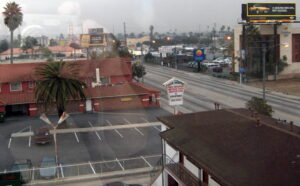
Inside, it was warm, walls were soft adobe coral, trimmed in hacienda green, Christmas decorations everywhere. “Good evening Senora,” as I was seated. I ordered #5, chilies rellaño. Chips were set before me, laughter was behind me. The music was playing, a Spanish song of happiness, I could tell, even though I did not understand the words.
This was the first day of my trip to Antarctica.

